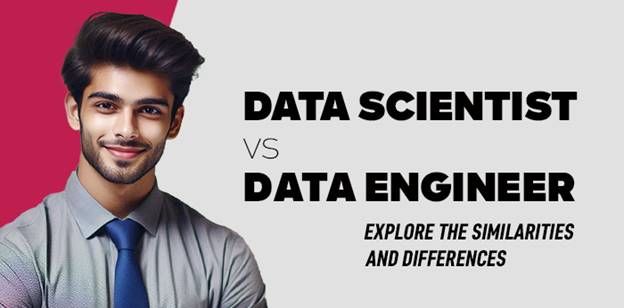
In the era of big data, the roles of data scientist and data engineer have become increasingly pivotal. While they both work with data, their specific responsibilities and required skill sets differ significantly. Data scientists focus on extracting insights and making predictions from data, while data engineers build and maintain the infrastructure necessary for data analysis. This article will delve into the key distinctions between these two professions, exploring their roles, similarities, differences, skills, and career paths. By understanding these nuances, you can make an informed decision about which path aligns best with your interests and goals.
Join 100% Online Degree programs UGC Entitled and Affordable
An individual who is considered to be an expert in the subject of data science is someone who is able to extract usable information from enormous datasets by utilising their knowledge and abilities in the domains of statistics, programming, and business intelligence. They are able to handle difficult issues, identify patterns, and create estimates based on data because they make use of the unique knowledge that they possess.
The Bachelor of Computer Application (BCA) and Master of Computer Applications (MCA) programs in Amrita AHEAD, Amrita Vishwa Vidyapeetham include data science in the syllabus.
When it comes to the realm of data-driven technology, data engineers are the unsung heroes. They are responsible for the construction and upkeep of the infrastructure that offers data scientists the opportunity to derive significant insights. Data is guaranteed to be accessible, dependable, and safe thanks to their knowledge in database management systems, programming, and cloud computing as well. In order to make educated decisions and propel innovation, they are indispensable for businesses that rely on data.
|
Feature |
Data Scientist |
Data Engineer |
|
Focus |
Analyzing data to extract insights and make predictions |
Designing, building, and maintaining data infrastructure |
|
Skills |
Statistics, machine learning, data visualization, programming |
Database management, cloud computing, ETL processes, programming |
|
Tools |
Python, R, SQL, Tableau, Jupyter Notebook |
SQL, Python, Java, Scala, Hadoop, Spark, AWS, GCP, Azure |
|
Role |
Storyteller of data |
Architect of data infrastructure |
|
Collaboration |
Works closely with data engineers to access and prepare data |
Collaborates with data scientists to understand data requirements and build appropriate infrastructure |
In the realm of data analytics, the data scientist and the data engineer are two key roles that play crucial parts in extracting value from vast datasets. While they may seem similar on the surface, their specific responsibilities and skill sets differ significantly.
Data Scientist
A data scientist is often described as the “storyteller of data.” Their primary responsibility is to analyze complex datasets to uncover hidden patterns, trends, and insights. They use these insights to drive business decisions and solve problems.
Key Responsibilities:
Data Engineer
A data engineer is the “architect” of data infrastructure. Their role is to design, build, and maintain the systems that store, process, and manage large volumes of data. They ensure that data is accessible, reliable, and secure for data scientists and other users.
Key Responsibilities:
|
Job Title |
Average Base Salary (INR) |
Location |
|
Data Scientist |
₹11,00,000 – ₹25,00,000 |
Bengaluru, Delhi, Mumbai, Hyderabad |
|
Senior Data Scientist |
₹15,00,000 – ₹35,00,000 |
Bengaluru, Delhi, Mumbai, Hyderabad |
|
Lead Data Scientist |
₹20,00,000 – ₹50,00,000 |
Bengaluru, Delhi, Mumbai, Hyderabad |
|
Machine Learning Engineer |
₹12,00,000 – ₹28,00,000 |
Bengaluru, Delhi, Mumbai, Hyderabad |
|
Data Analyst |
₹6,00,000 – ₹12,00,000 |
Bengaluru, Delhi, Mumbai, Hyderabad |
|
Data Engineer |
₹10,00,000 – ₹22,00,000 |
Bengaluru, Delhi, Mumbai, Hyderabad |
In the era of big data, the roles of data scientist and data engineer have become increasingly important. While they both work with data, their specific responsibilities and required skill sets differ significantly.
Data Scientist Skills
Data Engineer Skills
In the realm of data analytics, the data scientist and the data engineer play complementary roles. While data scientists focus on extracting insights and making predictions, data engineers ensure that the necessary data infrastructure is in place. Both roles require strong technical skills, but their specific areas of expertise differ. Understanding these distinctions can help you determine which career path aligns best with your interests and skills. Ultimately, both professions are essential for driving innovation and making data-driven decisions in today’s data-centric world.
You May Also Like: